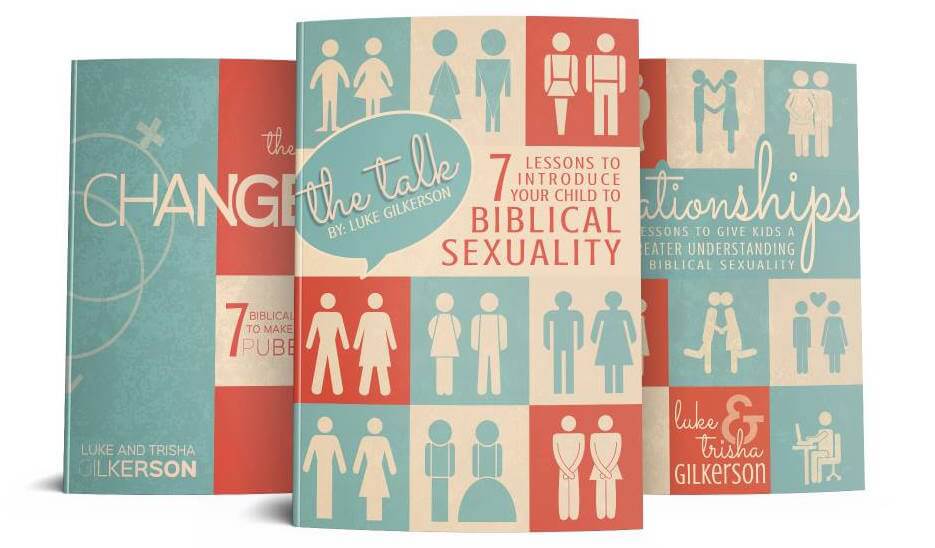Just how explicit should sex education be?
The other day I was reading through a sermon transcript of a well-known preacher. (If I said his name, you would recognize it.) In his lengthy message, he addressed a vast number of topics, and among those topics was the issue of sex ed.
His advice to parents was far from reserved.

He told parents they needed to teach their children diligently, not just about sexual morality in general, but about specific sexual topics.
- He mentioned sins like adultery, rape, lusting after someone else’s wife, prostitution, and the devastating consequences of “whoring.”
- He seemed totally comfortable with parents using biological descriptions like “foreskin” and “nocturnal emissions,” and even telling parents to describe the sexual act as “going into” a woman.
- He didn’t seem to flinch talking about sexual perversions like incest and crossdressing.
- He even talked about the bloody “evidence” of virginity when a woman’s hymen breaks on her wedding night.
Moreover, his entire congregation was present that day—from men and women all the way down to nursing children.
Should the church be encouraging parents to engage in this kind of sex education?
When sex education was biblical…
The above sermon was not from a preacher in this century, or even the century before.
I am referring the famous sermon preached by Moses in Deuteronomy 5-26.
In what would be one of his last sermons to Israel, Moses calls the next generation to remain faithful to the Lord as they prepare to enter the Promised Land. An essential part of Moses’ admonition includes the training of children. Moses directs the parents in Israel to teach his very words to their kids: “talk of them when you sit in your house, and when you walk by the way, and when you lie down, and when you rise” (6:7).
Moses says parents are responsible for instructing their children about a wide variety of topics, including matters related to sexuality—and instruction often needs to be detailed and frank (21:10-12; 22:5, 13-30; 23:10-11, 17; 24:1-4; 25:5-12).
Of course, this should not surprise us at all. After all, Israel was about to enter the land of Canaan, a land full of its own idol gods—many of whom were celebrations of ungodly sexuality. Israel would no doubt find graven images of the voluptuous Amorite goddess Nayana, the bisexual Hittitle goddess Šauška, and the Canaanite fertility god Ba’al and his nude cohort Asherah. Canaan was full of fertility cults. It was a land where sexual orgies were commonplace, a land filled with tribes of people who lived totally contrary to God’s sexual standards.
In the face of such rampant sexual idolatry, Moses trains the parents in Israel to teach their children God’s expectations about sex.
Modern sex education gone crazy
Of course, just because Moses encouraged—rather, commanded—Israel’s parents to be involved in sex education does not mean all sex education today is good. Far from it.
Modern sex education in the last century has a lot of its roots in the pioneering work done by Alfred Kinsey, the father of sexology. Kinsey’s groundbreaking “research” on human sexuality in the late 40s and early 50s were some of the first to say children are “sexual from birth.”
Now, if Kinsey merely meant that children are gendered beings—with male or female anatomy and brains—this would hardly be controversial. But for Kinsey, saying children are “sexual from birth” meant children are naturally interested in sexual acts. Kinsey promoted the idea that it was normal and healthy for children and adolescents to experiment not just with masturbation but vaginal intercourse, sodomy, and even bestiality.
Kinsey believed morality should be left out of sex education altogether, and that it should be taught only by a handful of trained health professionals. In the years that followed, this is exactly what began to happen.
- In 1968, Kinsey Report co-author Wardell Pomeroy was made the academic dean at the Institute for Advanced Study of Human Sexuality. This institute trained more than 100,000 sex educators—often through the use of graphic pornography.
- In 1964, the Sexuality Information and Education Council of the United States (SIECUS) was founded to promote public sex education, where they sought to educate the public about “the vital importance of infant and childhood sexuality.” SIECUS encouraged teens to engage in “safe sex” practices and called for masturbation to be taught in public schools as a “universal” and “useful” practice.
In 2007, SIECUS helped to found the Future of Sex Education Initiative (FoSE), eventually developing the first-ever National Sexuality Education Standards, a detailed K-12 list of education standards now being used in 32 states. While many of their standards are very good (teaching kids proper names for body parts, the biology of human reproduction, personal hygiene, treating others with dignity, etc.), other standards are questionable at best…
- By the end of 2nd grade, students are expected to “identify different kinds of family structures” (daddy-and-mommy, two-daddies, two-mommies, etc.) and show respect to these structures.
- By the end of 5th grade, students are expected to know how to prevent STD transmission.
- By the end of 8th grade, students are not only expected to know how to use a condom, they are also expected to be able to elucidate concepts like “gender identity,” “gender expression,” and “sexual orientation.”
- By the end of 12th grade, students are expected to know how to access information about “pregnancy options,” including “emergency contraception” (abortion). Students are also expected to know how the “human sexual response cycle” of sexual excitement and orgasm works.
- Students are taught to seek out “medically accurate” information about sex, but then are encouraged to seek advice from organizations that go beyond the biological to the ethical, organizations that promote sex outside of marriage, same-sex attraction, transgenderism, and abortion.
The problems with these standards is not so much the information presented but the context in which they are presented.
The underlying assumption in a lot of public sex education is that children should be encouraged towards their own individualized sexual expression. One of the primary goals of these institutions is not just to divorce sex from traditional forms of morality, but to encourage children to discover their own values apart from parents, religion, or society—what they call “values clarification“—especially if parents, religion, and society disagree with Kinsey-inspired sexual ethics.
Reclaiming sex education: Moses vs. Kinsey
Don’t misunderstand me. I am well aware those who don’t have Christian convictions have zero motivation to accept Christian ethics. I don’t for a minute expect secular public education standards to bow to the Bible.
I say these things not to condemn public educators or how sex ed is done in schools but rather to reissue Moses’ challenge to Israel back to the church. As Israel kept God’s statutes, Moses’ vision was that the surrounding people would say, “Surely this great nation is a wise and understanding people” (Deut. 4:6).
Christian sexual ethics, faithfully lived out, is a powerful witness to a watching world. Like Israel entering Canaan, we are surrounded by sexual idolatry on all sides, but when the world looks in at the church and sees a different kind of sexual revolution—one based on Christ-like love and in keeping with our design as His image-bearers—we can begin to redeem our culture from the inside out.
And it all starts with Christian parents being willing to teach their children about biblical sexuality:
- Be as forthright as the Bible: no more, no less – The Bible isn’t shy about sex. It is frank and matter-of-fact. We do our children no favors by sanitizing the Bible and not explaining its rich wisdom. Yes, we should do so in keeping with the different stages of our children’s intellectual development (for the same reason you don’t teach calculus to 4-year-olds), but we should be eager to let the Bible speak to all areas of life—including sex. At the same time, it is possible to be too explicit to the point of being titillating. Give enough biological information to display what the Bible means without being graphic.
- Never disconnect sexual ethics from God’s creative intent – Often Christian sexual ethics are seen as arbitrary rules, nothing more than holdovers from an antiquated, prudish past. But everything God’s moral law commands is in keeping with how he designed us to flourish as human beings. As such, his laws are never arbitrary. Our children need to see the wisdom of God’s creative intent in the way He designed our bodies, in the way He designed marriage and family, in the way He designed our sexual drives and passions.
- Always teach the goodness of sex and the power of sex; not just one or the other – When we teach our kids only about the goodness of sex to the exclusion of its power, we end up where Alfred Kinsey did, where sex is good anytime, anywhere, with anyone. When we teach our kids only about the power of sex to the exclusion of its goodness, we end up where overly conservative cultures do, where anything sexual is treated with automatic suspicion and shame. In reality we need to stress both because that’s exactly what the Bible does. The same Holy Spirit that inspired the 7th commandment also inspired the Song of Solomon.
Moses knew his vision would not come to pass. Israel would not make the nations sit up and take notice of how wise they were—at least not for long. God told him this would happen: “they will forsake me and break my covenant that I have made with them” (Deuteronomy 31:16). But amidst this dismal prediction of failure, Moses also gave us a promise of hope: that someday God “will circumcise your heart” (30:6) so that we can walk in His ways.
We are living in those days of promise. We are the ones “on whom the end of the ages has come” (1 Corinthians 10:11), and by the power of His Spirit, even our children can demonstrate God’s wisdom to a watching world (James 3:17)—a wisdom that is, first of all, pure.
Let God’s Revelation Guide You
God didn’t just throw sex to us like a live grenade, saying, “Here, play with this for a while; you’ll figure it out.” He has told us what sex is for.
Sex education is best done when it is guided by God’s revelation…
- The special revelation of the Scriptures – The Bible is filled with many valuable insights about sexuality, marriage, family, and love. It is our primary source to teach our kids.
- The general revelation of God’s created world – God has created us in His own image, which means our bodies and minds also reveal something to us about who God is and His purposes for sex.
If you’re looking for practical, read-aloud resources you can use with your kids, I encourage you to check out The Talk series.
Think of these books like “Bible study meets biology lesson.” They are frank, down-to-earth, Bible studies you discuss with your kids that allow the Scriptures to break the ice on these subjects.












Thank you for this! I just read this Bible passage with my 8th Grade son as we are using Journey Through the Bible as our Bible curriculum. I have also used the first two of your Talk books. They are fabulous! Thank you for those resources!
So glad you liked the books!
“Always teach the goodness of sex and the power of sex; not just one or the other.” I had never considered how critical it is to cover the contrast of both the power and the goodness of sex! Thank you for spelling that point out clearly and explaining the benefit of finding balance and not falling on either extreme. As always, your wisdom is spot-on, biblical, and relevant. Thank you so much for sharing your insight!!
Glad that point was helpful to you!
Sex ed should NOT be up to the government to teach. Why are parents handing this delicate subject over to the government? The schools teach sex ed in 5th grade where I live. Not only is it not the right time to be teaching because the kids are (or at least mine were) still thinking about Legos and Barbie Dolls, not sex! OK, yea, they may be thinking about who they want to marry etc (Princess stories), but not in a sexual way! If you take Sex Ed from a Biblical standpoint this is always the best route even in 5th grade. I chose to wait until 7th grade (12 years old). But our schools and government want to take it to a very different level. OPT OUT parents and do this yourself! There is something so wonderful about teaching your child the beauty of sex through God’s eyes, not through the way of the world!
I assume you’re just voicing your opinion on the matter of government-run schools, even though I don’t really voice my thoughts on the matter in this article. But I am inclined to agree with you—not just when it comes to sex ed, but when it comes to a lot of subjects.